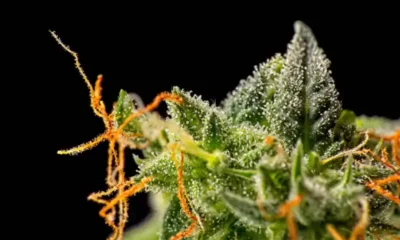Connect with us
Published
2 years agoon

Though Canada legalized cannabis back in 2018, the country is looking ahead at options to supercharge the growing industry. As a means to that end, one national organization, the Canadian Cannabis Tourism Association (CCTA), is focusing on cannabis tourism and hospitality, hoping to shift the country’s policy to embrace the market’s full potential.
Founding member Elizabeth Becker spoke to TheGrowthOp about the untapped potential in the budding industry. The CCTA argues that the federal Cannabis Act does not adequately address the social and public consumption of cannabis, ultimately limiting opportunities for businesses, residents and tourists.
The CCTA website says these regulatory gaps are “critical to address” to adequately support entrepreneurial activity around cannabis tourism and hospitality in Canada.
“Tourism is an institutional arrangement that is supported by the government through regulation,” the site states. “In order for the cannabis tourism industry to move forward in a socially responsible and sustainable way, regulation is required in the area of cannabis consumption, marketing and advertising.”
CCTA says that cannabis tourism could potentially play “an integral role” in generating new opportunities and replacing significant losses caused by the COVID-19 pandemic.
“Regulation, however, first needs to be established and implemented through a collaborative industry-led approach to setting standards,” it says.
Becker said she and other founding members wanted to create the national organization to have a voice in the government and work toward a more robust Canadian cannabis tourism market in the future.
“We are very interested in putting Canada on the map as the international destination for cannabis tourism,” Becker said. “We’re the first country in the G7 to legalize at the federal level, and we feel that it’s our right to be able to advertise internationally so that people can come here and enjoy our relaxed laws and our great community. “
CCTA is open to individuals and companies working to create Canadian tourism and hospitality experiences involving cannabis, with a $100 membership fee.
The organization is still in its infancy, though Becker said that its honing in on policy at the provincial level. Because regulations vary across provinces, it’s a hefty task, though Becker said this approach allows CCTA to highlight when provinces get something right. As an example, she mentioned regulatory changes in Alberta that allow retailers to offer online cannabis sales and delivery, calling it a “huge breakthrough.”
“So the [CCTA] is good for us to understand, how did they accomplish that? And how can we leverage that information and those resources so that we can talk to the other provinces?” Becker posed.
Becker is also the founder and CEO of HiBnB, which allows users to book cannabis-friendly accommodations, excursions and activities online. She also noted the similarities between canna-tourism and the wine industry.
“The general public, the first thing they want is to travel to places where you’re seeing the cannabis growing, and you’re learning about it, and you can taste it and sample it and purchase it,” Becker said. “That’s really what they want to have.”
CCTA also wants to look at the future potential for cafes and restaurants to have cannabis products available to consumers. It argues that implementing effective cannabis sales is one element of the equation, though regulators ultimately failed to consider how people will consume and where they’ll do it.
The CCTA also regularly references mature U.S. markets for guidance about developing Canada’s cannabis tourism, especially surrounding collaboration with local governments. Cannabis is still federally illegal in the U.S., though fellow CCTA founding member Susan Dupej told The GrowthOp that the state markets still provide a great deal of examples to draw from.
CCTA also wants to embrace public education around cannabis, especially for new consumers. Becker said that one bad experience can shape people’s perception of cannabis, which can further exasperate counterproductive stigmas and stereotypes.
“For a lot of people who haven’t tried cannabis, it’s not easy to understand the entry point,” she said. “And it’s only through education that we can find change.”


Despite City Efforts, Hemp Shops Posing as Dispensaries Prevail in Las Vegas


Cannabis Community, Investors React to DEA Decision To Reschedule


Georgia Governor Signs Bill Establishing Licensing Requirements To Grow Hemp


Study: Psilocybin Enhances Meditation


Ohio GOP Lawmakers Debate Adult-Use MJ Priorities, Eye June for Regulation Approval


Taylor Swift Puts Narcotics Into All of Her Songs on ‘The Tortured Poets Department’
